Recording the Catch
As recreational fisheries are being monitored more closely, it is becoming more important to record details about fishing effort, as well as just the catch. This means recording data on how many people are fishing and how long they spend fishing, as well as their method of fishing and what species they are targeting. This information is important as scientists use it to estimate relative abundance of fish.
|
|
It is difficult to know how much impact recreational fishing is having on shark populations, but at the moment it is thought to be quite minor. The amount of sharks and rays caught by fishers will usually be a very small part of their total catch.
It is likely that any significant damage to shark and ray populations worldwide will be as a result of commercial fisheries, even if just as bycatch. There are no known examples of recreational fishers being solely responsible for the over-fishing of any shark or ray species.
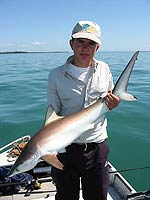
Spot tailed whaler
(Carcharhinus sorrah)
(© Neil Schultz)
|
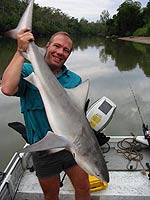
River whalers also known as bull sharks
(Carcharhinus leucas)
(© Neil Schultz) |
| 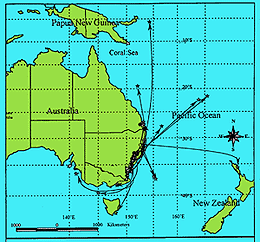
Map of mako shark movements, as determined from recaptures of recreationally tagged makos from the New South Wales Fisheries game fish tagging program. (© Ricky Chan) |
| Benefits of recreational shark fishing
In the long-term, recreational fishing for sharks may actually be doing more good than harm. In the majority of cases, information on shark biology and behaviour has only become available through the data collected by recreational tagging programs. For example, much has been learnt about the movement of blue and mako sharks as a result of recreational tagging both here in Australia and overseas. Information collected during game-fishing tournaments has also been very valuable in looking at worldwide population genetics of sharks.
While our knowledge of the offshore recreational fishery for large sharks is now quite good, there is not a lot of information on recreational catches of other species of sharks and rays. We are beginning to realise that there are some species of sharks that may be in danger of being over-fished. It is important to try and learn as much as we can about these animals in order to protect them in the future.
Kate Sputore (Rottnest Island Authority) adapted this information sheet (which is suitable for primary school students) from the information sheet compiled for the general public by © Julian Pepperell (pepj@austarnet.com.au).
This information sheet may be copied for educational purposes. For any other purpose please contact your State MESA representative: http://www.mesa.edu.au/council/contacts.asp
|
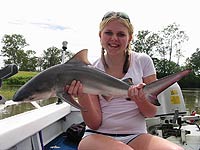
River whalers also known as bull sharks (Carcharhinus leucas)
(© Neil Schultz)
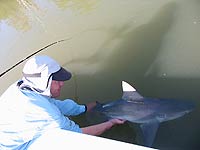
Release of tagged river whalers also known
as bull sharks (Carcharhinus leucas)
(© Neil Schultz)
|